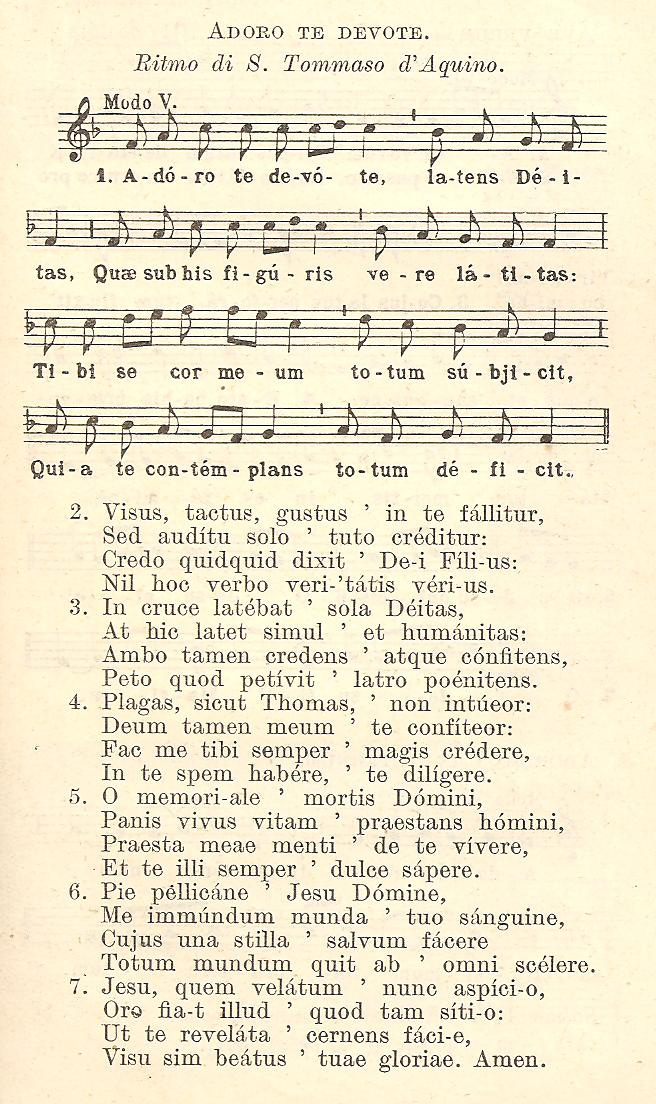As well as being the Angelic Doctor and Common Doctor of the Church, the greatest theologian and philosopher in history, whose very writings were taken by the Church as the miracles to prove his sainthood, St. Thomas Aquinas was also a brilliant poet and hymnographer. He composed many hymns for the great Solemnity of Corpus Christi, whose Mass he wrote at the request of the pope and which will be celebrated tomorrow (though in most parishes not with the Mass he composed). But another Eucharistic hymn of his is perhaps his most powerful.
Written for his private use at Mass and as a personal prayer for Adoration of the Blessed Sacrament, Adoro Te Devote was incorporated into the public worship of the Church by Pope St. Pius V for the definitive Roman missal in 1570. Sadly, like many other ancient traditions, it has since become merely optional and largely forgotten in the Novus Ordo.
Like all of St. Thomas’s hymns and prayers, it is not only heartfelt, like the words of the Psalter he knew by heart, but also theologically rich. It emphasizes what many Catholic apologists and evangelists are wont to forget: that faith is not merely a rational conclusion from philosophical arguments or historical proofs. Though these do exist, and provide “motives of credibility” as external supports to faith, faith itself is ultimately a supernatural virtue by which the intellect is moved by the will to assent to the truth of revelation infallibly transmitted by His Church, submitting to God’s divine authority as First Truth which surpasses but can never contradict reason. If faith is grounded in anything else, it is not faith in God but in oneself, an appropriation of His authority rather than a humble submission to it.
In this life, we are those who do not see, but still believe. Indeed, this is the condition of practically all the faithful throughout history, including the Chosen People of Israel who believed in Christ explicitly or implicitly by looking forward to His messianic coming, and even the apostles who, although witnessing Christ’s miracles, still only saw His human image, not His invisible divinity. Today, we behold God Himself in the Eucharist, but to our eyes, and even the eyes of our mind, we see only the accidental appearances of bread and wine, not the divine Mystery hidden within.
This Solemnity of Corpus Christi, may we remember what it truly means to have faith, and may the beautiful words of St. Thomas inspire us to love, adore, serve and celebrate the Blessed Sacrament as God’s greatest gift in history: Himself.
Latin:
Adoro te devote, latens deitas,
Quæ sub his figuris vere latitas;
Tibi se cor meum totum subicit,
Quia te contemplans totum deficit.
Visus, tactus, gustus in te fallitur,
Sed auditu solo tuto creditur.
Credo quidquid dixit Dei Filius;
Nil hoc verbo Veritátis[6] verius.
In Cruce[6] latebat sola Deitas,
At hic latet simul et Humanitas,
Ambo tamen credens atque confitens,
Peto quod petivit latro pœnitens.
Plagas, sicut Thomas, non intueor:
Deum tamen meum te confiteor.
Fac me tibi semper magis credere,
In te spem habere, te diligere.
O memoriale mortis Domini,
Panis vivus, vitam præstans homini,
Præsta meæ menti de te vívere,
Et te illi semper dulce sapere.
Pie Pelicane, Jesu Domine,
Me immundum munda tuo Sanguine:[6]
Cujus una stilla salvum facere
Totum mundum quit ab omni scelere.
Jesu, quem velatum nunc aspicio,
Oro, fiat illud quod tam sitio:
Ut te revelata cernens facie,
Visu sim beátus tuæ gloriæ. Amen.
English translation by the great poet, Fr. Gerard Manley Hopkins:
Godhead here in hiding, whom I do adore,
Masked by these bare shadows, shape and nothing more,
See, Lord, at Thy service low lies here a heart
Lost, all lost in wonder at the God thou art.
Seeing, touching, tasting are in thee deceived:
How says trusty hearing? that shall be believed;
What God’s Son has told me, take for truth I do;
Truth Himself speaks truly or there’s nothing true.
On the cross Thy godhead made no sign to men,
Here Thy very manhood steals from human ken:
Both are my confession, both are my belief,
And I pray the prayer of the dying thief.
I am not like Thomas, wounds I cannot see,
But can plainly call thee Lord and God as he;
Let me to a deeper faith daily nearer move,
Daily make me harder hope and dearer love.
O thou our reminder of Christ crucified,
Living Bread, the life of us for whom he died,
Lend this life to me then: feed and feast my mind,
There be thou the sweetness man was meant to find.
Bring the tender tale true of the Pelican;
Bathe me, Jesu Lord, in what Thy bosom ran
Blood whereof a single drop has power to win
All the world forgiveness of its world of sin.
Jesu, whom I look at shrouded here below,
I beseech thee send me what I thirst for so,
Some day to gaze on thee face to face in light
And be blest for ever with Thy glory’s sight. Amen.
Here is a beautiful sung version from the Gregorian Chant Academy:
Join the Fellowship at Saint Tolkien!
You can also check out my new Etsy shop, Via Pulchritudinis, celebrating the beauty of Catholic Tradition!




